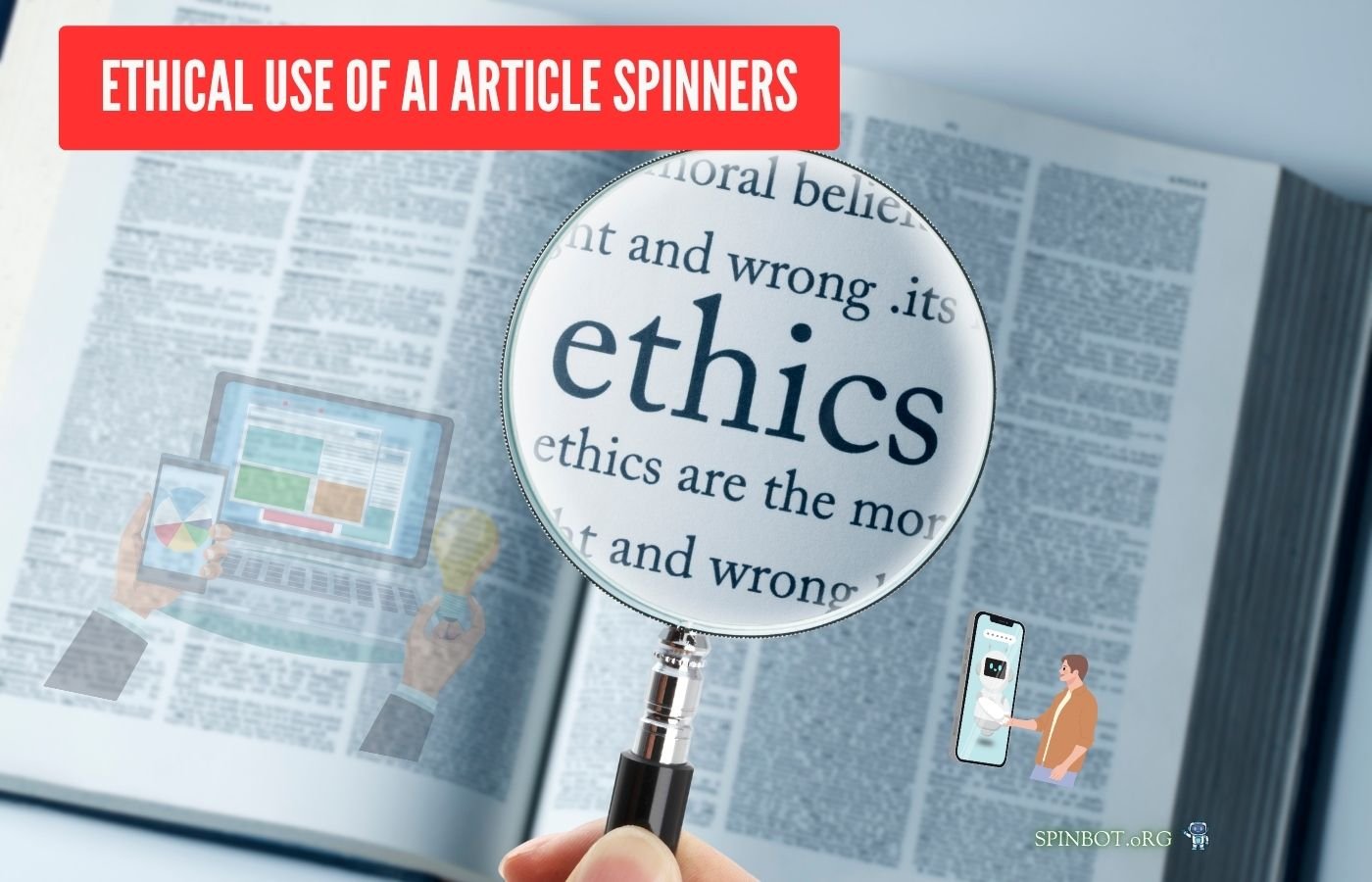In recent years, Artificial Intelligence (AI) has revolutionized numerous industries, including content creation. One of the most notable applications is AI article spinners, which are tools that rewrite or paraphrase content automatically. While these tools have made content creation faster and more efficient, their ethical use remains a topic of ongoing debate. This article delves into the ethical considerations surrounding AI article spinners, how to use them responsibly, and the potential impact they can have on content creation and academic writing.
What is an AI Spinner?
Understanding AI Article Spinners
AI article spinners are software tools designed to automatically rewrite or paraphrase content. They utilize Natural Language Processing (NLP) and machine learning algorithms to analyze existing text and generate new versions of it while maintaining the original meaning. The main purpose of these tools is to help writers, marketers, and content creators quickly produce multiple versions of an article or post.
However, while they provide convenience, they also raise significant ethical concerns, especially when misused. It’s crucial to understand what an AI spinner is, its capabilities, and its limitations to ensure that it is used ethically.
How Do AI Article Spinners Work?
AI article spinners use complex algorithms to analyze the structure, grammar, and vocabulary of a piece of text. The software identifies synonyms for words, rewrites sentence structures, and creates paraphrased versions of the original content. The goal is to maintain the original meaning while producing a version that appears distinct enough to avoid plagiarism detection tools.
What Are the Ethical Issues in Artificial Intelligence Articles?
While AI article spinners can be incredibly useful, they also introduce several ethical issues. These concerns stem from how the tool is used and the potential consequences of misuse.
Plagiarism and Copyright Infringement
One of the most significant ethical concerns regarding AI article spinners is the risk of plagiarism. Since these tools can automatically paraphrase content, there’s a possibility that the rewritten articles are too similar to the original sources. This can lead to legal and moral issues, especially if the content is used without proper attribution.
- Plagiarism Risk: AI spinners may unintentionally replicate sections of content too closely, violating copyright laws.
- Intellectual Property Concerns: The original creators may not receive credit for their work, which can lead to a loss of recognition and income.
Misinformation and Lack of Accountability
AI-generated content can easily spread misinformation if not properly monitored. Spinners often lack the ability to critically assess the accuracy of the content they produce. As a result, inaccurate, misleading, or biased information can be propagated, especially when AI tools are used to generate content at scale.
- Misinformation: AI spinners may inadvertently generate factually incorrect or misleading content.
- Accountability Issues: Since AI systems operate autonomously, holding them accountable for their outputs is challenging.
Erosion of Originality and Creativity
The over-reliance on AI spinners could potentially erode human creativity. When content creators rely too heavily on AI to generate their articles, they may stop producing original and valuable content. The shift towards automation could also reduce the need for skilled writers and journalists.
- Loss of Creativity: Overuse of AI in content creation can stifle innovation and creativity in writing.
- Diminished Writing Skills: Writers may become overly dependent on AI tools, losing the ability to craft high-quality, original content.
Ethical Use in SEO
SEO (Search Engine Optimization) is a crucial element of digital marketing, and many AI article spinners are used to create content aimed at ranking highly on search engines. However, AI-generated content can often be low-quality, repetitive, or spammy, which may negatively affect the user experience. Search engines like Google prioritize high-quality, informative content, and using AI tools irresponsibly could lead to penalties.
- Spammy Content: AI spinners can churn out keyword-heavy, low-value content that does not serve the user’s intent.
- Impact on Search Engine Rankings: Poorly executed AI content may result in penalties from search engines like Google.
What is the Ethical Usage of AI?
Defining Ethical Use of AI
The ethical usage of AI refers to employing AI technologies in a way that aligns with moral principles, fairness, transparency, and accountability. Ethical AI ensures that AI systems benefit society without causing harm, misrepresentation, or inequality. In the context of AI article spinners, ethical use focuses on producing high-quality content that adds value to the reader, adheres to copyright laws, and avoids promoting harmful or misleading information.
- Fairness: AI tools should be used in ways that benefit all stakeholders, including content creators, readers, and the original authors of the source material.
- Transparency: It is important to disclose when AI is used to generate content to maintain trust with the audience.
- Accountability: Content creators and AI developers must take responsibility for the output produced by AI systems.
How to Use AI Article Spinners Ethically
- Human Oversight: Always review AI-generated content to ensure it aligns with your ethical standards. Human editing is essential to prevent errors, misinformation, and poor-quality writing.
- Avoid Plagiarism: Ensure that AI spinners do not produce content that is too similar to the original material. Use plagiarism-checking tools to verify the uniqueness of the rewritten text.
- Add Value: AI tools should be used to enhance content, not replace human creativity. Writers should aim to add their insights, perspectives, and creativity to the AI-generated text.
Ethical Use of AI in Academic Writing
AI article spinners have become increasingly popular in academic writing, where they are used to paraphrase research papers, articles, and other scholarly content. However, their use in academic writing raises several concerns about originality, integrity, and academic honesty.
Impact on Academic Integrity
The use of AI spinners in academic writing can compromise academic integrity. If students or researchers rely too heavily on AI tools to paraphrase or reword content, it can lead to unintentional plagiarism or a lack of original thought.
- Violation of Academic Integrity: Using AI to paraphrase content without proper citations may violate academic policies on plagiarism.
- Lack of Critical Thinking: Over-reliance on AI tools may hinder students’ ability to think critically and develop their own arguments.
Ethical Use in Research and Publishing
AI tools can be used ethically in academic and scientific writing by ensuring that content is properly cited, well-researched, and provides new insights. Researchers can use AI spinners to summarize large volumes of text or to reword information for clarity, but they should always ensure that the original meaning is maintained and properly credited.
- Use AI for Summarization: Researchers can use AI tools to summarize lengthy papers or articles, but they should add their own interpretation and analysis.
- Cite Original Sources: Always cite the original sources when using AI to paraphrase or reword content to maintain transparency and academic honesty.
Best Practices for Ethical Use of AI Article Spinners
To ensure that AI article spinners are used ethically, here are some best practices to follow:
Maintain Transparency
Always disclose when AI has been used to generate or rewrite content. Transparency helps maintain trust with your audience and ensures that the content is seen as credible.
- Label AI-Generated Content: Make it clear when an article has been spun or rewritten by AI, especially in professional or academic contexts.
- Be Honest About Limitations: Acknowledge the limitations of AI tools in content generation, such as their inability to verify facts or create original research.
Avoid Overuse of AI Tools
AI should complement, not replace, human creativity and expertise. Using AI article spinners in moderation ensures that content remains original and high-quality.
- Balance AI and Human Input: Use AI to assist with idea generation, research, or content structuring, but always add your own insights and expertise to the content.
- Focus on Quality: Aim to produce content that provides real value to the reader, rather than churning out large quantities of low-quality text.
Conduct Regular Quality Checks
AI tools can make mistakes, so it’s essential to review and refine the generated content before publishing. This step helps prevent plagiarism, factual errors, and other issues that could harm your reputation.
- Use Plagiarism Checkers: Regularly check for similarities between AI-generated content and original sources.
- Fact-Check the Content: Ensure that the AI-generated content is accurate, especially when discussing complex topics like scientific research or academic writing.
Ethical Use of AI in Scientific Writing: Current Trends
In the scientific community, AI is increasingly being used to assist in research, writing, and publishing. However, ethical concerns still persist, particularly when AI is used to generate large volumes of research papers or summarize complex studies.
1. Improving Efficiency Without Compromising Integrity
AI can significantly improve efficiency in scientific writing by automating repetitive tasks, such as data analysis, summarization, and referencing. However, it is important to ensure that these tools are used ethically to maintain the integrity of the research process.
- Enhancing Productivity: Use AI to automate tedious tasks but always ensure that the final work meets ethical and academic standards.
- Maintaining Accuracy: AI tools should not replace the need for human judgment when it comes to interpreting and analyzing data.
Conclusion: The Future of Ethical AI Article Spinners
The ethical use of AI article spinners is crucial for maintaining the integrity and quality of content in both professional and academic contexts. While AI tools offer convenience and efficiency, they should be used responsibly to avoid plagiarism, misinformation, and a reduction in creativity. By adhering to best practices, maintaining transparency, and ensuring human oversight, content creators can ensure that AI tools serve as valuable assets rather than ethical liabilities.
The future of AI in content creation looks promising, but it must be approached with caution and responsibility. As AI continues to evolve, ethical guidelines and regulations will play an increasingly important role in ensuring that these tools are used for the benefit of society, rather than detracting from it.

Academic editor turned AI copy pro, Sarah-Jane fuses research precision with smart storytelling. Her insights build trust, spark ideas, and elevate every word with real-world writing experience.

